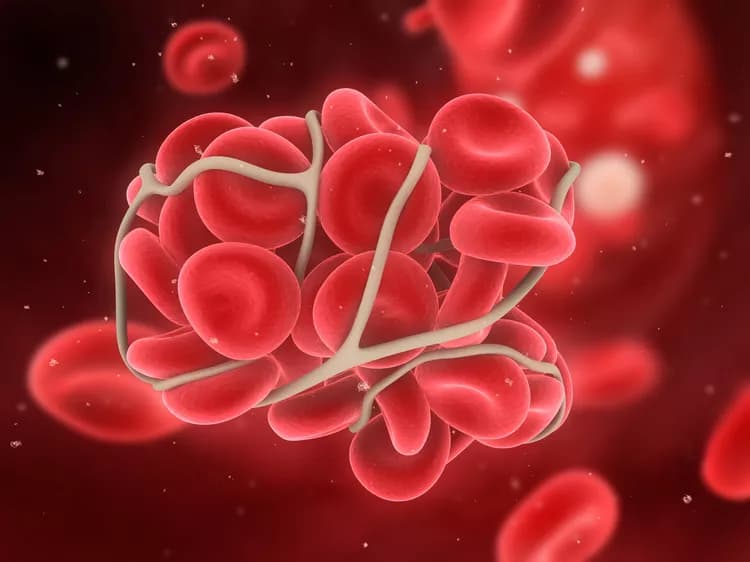
Blood-clotting Protein Prevents Repair In The Brain
Picture a bare wire, without its regular plastic coating. It's exposed to the elements and risks being degraded. And, without insulation, it may not conduct electricity as well as a coated wire. Now, imagine this wire is inside your brain.
That's what happens in many diseases of the nervous system, such as multiple sclerosis (MS), spinal cord injuries, stroke, neonatal brain injuries, and even Alzheimer's disease.
Much like that bare wire, the nerve fibers in the brain lose their protective coating, called myelin, and become extremely vulnerable. This leaves the nerve cells exposed to their environment and reduces their ability to transmit signals quickly, resulting in impaired cognition, sensation, and movement.
In disease, the brain seems to activate mechanisms to repair myelin, but cannot complete the process. For years, scientists have been trying to understand why these repair mechanisms are halted, as overcoming this obstacle holds great potential for treating disabling neurological diseases.
Katerina Akassoglou, PhD, and her research team at the Gladstone Institutes uncovered a promising new therapeutic strategy. Surprisingly, it's associated with a protein in the blood.
They found that when fibrinogen (a blood-clotting protein) leaks into the central nervous system, it stops brain cells from producing myelin and, as a result, prevents repair.
The Culprit Is a Protein in the Blood
The cells needed to repair myelin already exist in the central nervous system. They are adult stem cells that travel to sites of damage, where they mature into myelin-producing cells. However, in many neurological diseases, this process is blocked. This is why the brain is unable to repair damaged myelin.
In an effort to understand why the brain can't repair itself, scientists have focused on understanding what happens inside the cell. Akassoglou took a different approach.
"We thought it might be important to look instead at the toxic environment outside the cell, where blood proteins accumulate" said Akassoglou, senior investigator at Gladstone, professor of neurology at UC San Francisco (UCSF), and senior author of a study published by the scientific journal Neuron. "We realized that targeting the blood protein fibrinogen could open up the possibility for new types of therapies to promote brain repair."
Akassoglou has spent much of her career studying the role of the blood-brain barrier and fibrinogen in neurological diseases. She previously showed that when blood leaks into the brain, fibrinogen causes inflammation by acting in brain immune cells, which can lead to brain damage.
In the new study, Akassoglou and her team uncovered another, yet unexpected effect of blood leaking into the brain.
"We found that fibrinogen stops adult stem cells from transforming into the mature cells that produce myelin," explained first author of the study Mark Petersen, MD, a visiting scientist in Akassoglou's laboratory and an assistant adjunct professor of pediatrics at UCSF. "This blockade could be harmful for regeneration in the brain."
New Target Could Help Treat Multiple Sclerosis and Other Diseases
The regeneration of myelin in the brain is critical for diseases like MS, stroke, neonatal brain injury, and Alzheimer's disease. Now, the scientific community might get closer to making that happen.
"Repairing myelin by eliminating the toxic effects of vascular damage in the brain is a new frontier in disease therapeutics," said Lennart Mucke, MD, director of the Gladstone Institute of Neurological Disease and professor of neurology at UCSF. "This study could change the way we think about how to repair the brain."
Researchers can now look for new ways to target fibrinogen as a way to restore regenerative functions in the central nervous system. This could lead to novel therapies to help patients with MS and many other diseases associated with myelin.
Materials provided by Gladstone Institutes. Note: Content may be edited for style and length.
Disclaimer: DoveMed is not responsible for the accuracy of the adapted version of news releases posted to DoveMed by contributing universities and institutions.
References:
Mark A. Petersen, Jae Kyu Ryu, Kae-Jiun Chang, Ainhoa Etxeberria, Sophia Bardehle, Andrew S. Mendiola, Wanjiru Kamau-Devers, Stephen P.J. Fancy, Andrea Thor, Eric A. Bushong, Bernat Baeza-Raja, Catriona A. Syme, Michael D. Wu, Pamela E. Rios Coronado, Anke Meyer-Franke, Stephanie Yahn, Lauriane Pous, Jae K. Lee, Christian Schachtrup, Hans Lassmann, Eric J. Huang, May H. Han, Martina Absinta, Daniel S. Reich, Mark H. Ellisman, David H. Rowitch, Jonah R. Chan, Katerina Akassoglou. (2017). Fibrinogen Activates BMP Signaling in Oligodendrocyte Progenitor Cells and Inhibits Remyelination after Vascular Damage. Neuron. DOI: 10.1016/j.neuron.2017.10.008
Related Articles
Test Your Knowledge
Asked by users
Related Centers
Related Specialties
Related Physicians
Related Procedures
Related Resources
Join DoveHubs
and connect with fellow professionals

0 Comments
Please log in to post a comment.